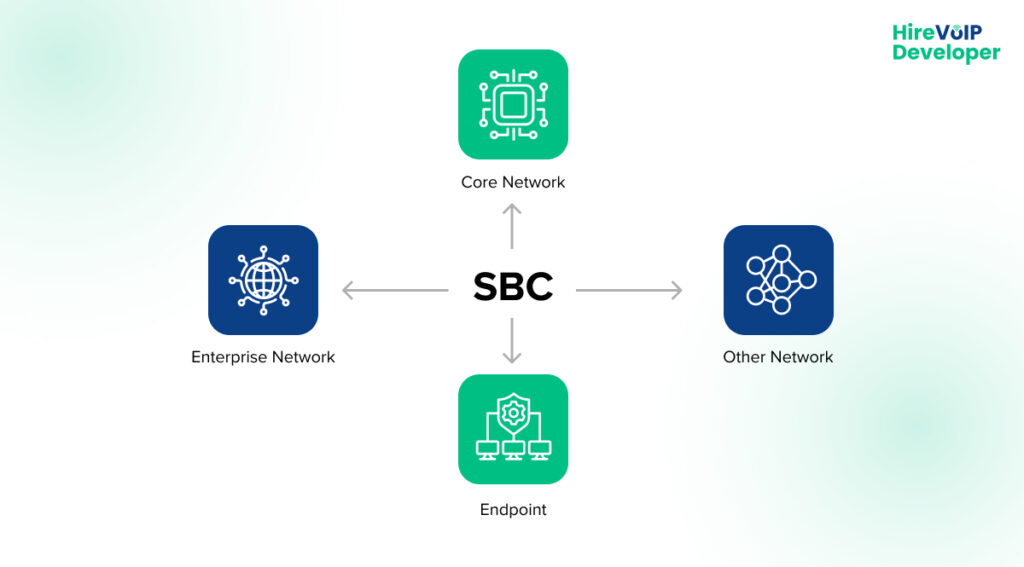Blog Summary: This blog explores the importance of Session Border Controllers (SBCs) for enhancing VoIP security. It details how SBCs protect against cyber threats, manage traffic, and ensure reliable communication. Additionally, it discusses different types of SBCs and their specific business applications, emphasizing the need for secure communication solutions.
VoIP solutions have become an important part of any business’s communication. They allow you to manage your business communication through different channels using a single platform, which eventually helps you improve your communication and build customer relationships. But as important as VoIP Solutions are, they are also sensitive and vulnerable to data breaches. A single malicious cyber attack can cost you dollars, and more than that, it directly impacts your customers’ trust in your company.
So, how can you protect your VoIP network from such threats?
SBC (Session Border Controller) secures your VoIP network and defends you against malicious cyber attacks. However, it is more than just security; SBC also helps to improve your call quality and performance. In this Blog Post, we will discuss what an SBC is, how it works, and how to secure your VoIP network from cyber threats.
What is a Session Border Controller?
A Session Border Controller (SBC) is a special type of device or software application that helps you control and manage your VoIP network effectively. It is like a Security shield for your VoIP communication.
SBC operates between two networks and processes messages from one network to another.

The Session Border Controller sits on the network border and examines the traffic that comes and goes in and out of the VoIP network. It authenticates, approves, modifies, monitors, and looks for suspicious activities.
Well, this is just an overview of a session border controller. If you think this understanding is enough, you can jump to the next section and explore further. But if you want to understand SBC one level deep, let me help you with a brief explanation of how SBC works behind the scenes.
How does SBC Work?
SBC’s main job is to be a watchful guard at the network’s border. It carefully checks the flow of data that comes in and goes out of the Voice over Internet Protocol (VoIP) network, playing a crucial role in VoIP security. It confirms the identity of users and devices to stop unauthorized access and only allows legitimate traffic through.
Once a user is verified, the system decides whether to allow or block specific data packets based on set security rules. This helps control what can pass through the network. The system can also change data packets to improve security or ensure they work correctly before reaching their destination.
Additionally, the system constantly monitors network activity. It looks at every communication in real-time, which helps it spot unusual activity or threats. By recognizing suspicious behavior, the system is essential for keeping the VoIP network safe and secure against cyber threats.
🚀 Upgrade Your VoIP Security! → Discover how SBCs can safeguard your business.
What Are the Different Types of Session Border Controllers?
There are several SBC applications that you can use based on your business needs. We mainly see four types of SBCs, each focused on different purposes to fulfill specific business requirements. Let’s explore them in detail.
1. Hardware SBCs
As the name suggests, hardware SBCs are physical devices that you need to integrate into your existing hardware infrastructure. These standalone units are purpose-built to handle high call volumes and provide robust security and performance for VoIP solutions.
| Key Features | Ideal For |
| High reliability and dedicated processing power. | Large enterprises with on-premise VoIP systems. |
| Strong protection against cyber threats like DDoS attacks. | VoIP service providers manage significant traffic volumes. |
| Minimal latency, ensuring superior call quality. |
2. Software SBCs
Software SBCs are virtual solutions that run on standard servers or virtual environments. They provide the same functions as hardware SBCs, but they are more flexible and easier to scale.
| Key Features | Ideal For |
| Cost-effective with no need for additional hardware. | Small to medium-sized businesses seeking flexibility. |
| Scalable to accommodate growing VoIP networks. | VoIP providers offer customizable solutions to clients. |
| Easy to deploy and maintain in dynamic environments. |
3. Cloud-based SBCs
Cloud-based SBCs are solutions that third-party providers host and manage. They are great for businesses that use cloud VoIP services or Unified Communication as a Service (UCaaS).
| Key Features | Ideal For |
| Eliminates the need for on-premise hardware. | Enterprises are adopting cloud-first strategies. |
| Offers on-demand scalability to support fluctuating traffic. | Service providers looking to offer scalable VoIP solutions without managing infrastructure. |
| Managed and updated by the provider for seamless operation. |
4. On-premise SBC
On-premise SBCs are installed directly in a company’s network. They give businesses full control over VoIP calls and data, making them a good choice for those who prioritize privacy and security.
| Key Features | Ideal For |
| Full control over configuration and security settings. | Enterprises in regulated industries like finance and healthcare. |
| Ideal for compliance with strict regulatory requirements. | Organizations are prioritizing data sovereignty and control. |
| Suitable for businesses with existing on-premise VoIP setups. |
What Are the Key Challenges in VoIP Systems Without an SBC?
A session border controller (SBC) is important in securing and managing your VoIP system. Without SBC, businesses and VoIP service providers face key problems that can disrupt operations and harm communication quality. Let’s look at these challenges.
A) For Enterprises
1. Security Vulnerabilities
Enterprises face various cyber threats, including data breaches, toll fraud, and unauthorized listening to private conversations. Without a session border controller (SBC), people can gain unauthorized access to the VoIP network, which can endanger data security and privacy.
2. Poor Call Quality
Issues like latency, jitter, and packet loss can disrupt internal and customer-facing communications. Poor traffic management causes inconsistent call quality, which lowers productivity and reduces customer satisfaction.
3. Scalability Challenges
As enterprises grow, their VoIP infrastructure must handle increased call volumes and new integrations. Without an SBC, scaling systems to meet demands becomes complex and prone to failures.
B) For VoIP Service Providers
1. Handling High Traffic Volumes Securely
VoIP service providers deal with multiple clients, making it challenging to handle high VoIP traffic efficiently. Without the security of Session Border Controllers, the VoIP system is a prime target for DDoS attacks and unauthorized access.
2. Ensuring Reliable Service Quality
Diverse client networks have varying requirements for call quality and connectivity. Without an SBC, maintaining consistent service quality across all clients is challenging.
Unmanaged traffic can result in dropped calls, poor audio, and dissatisfied customers.
3. Managing Compliance with Telecom Regulations
VoIP providers must adhere to local and international regulations for call handling, data security, and emergency services. Without an SBC, ensuring compliance with these regulations becomes difficult, risking penalties and service interruptions.
What Are the Benefits of Implementing a Session Border Controller?
A Session Border Controller (SBC) is more than a network component. It’s a strategic tool shaped by ongoing SBC development to improve VoIP systems’ performance, security, and scalability. Here’s how it benefits enterprises and VoIP service providers.
A. Improve Security
Security is a top priority in VoIP systems, and SBCs provide robust protection to safeguard communications.
Defense Against Cyber Threats: SBCs protect networks from common VoIP vulnerabilities, including toll fraud, phishing attacks, and Denial-of-Service (DoS) attacks.
Data Encryption: By encrypting voice data, SBCs ensure the confidentiality and integrity of communications, protecting sensitive enterprise and customer information.
Access Control: SBCs enforce strict authentication, ensuring only authorized users and devices can access the network.
B. Improved Call Quality and Reliability
Consistent call quality is essential for both enterprises and service providers to maintain professionalism and client trust.
Traffic Prioritization: SBCs prioritize VoIP traffic over non-critical data, ensuring clear and uninterrupted calls, even during peak network usage.
Call Optimization: By reducing latency, jitter, and packet loss, SBCs enhance overall call reliability.
Redundancy Management: SBCs can reroute calls automatically during network failures, minimizing downtime.
C. Interoperability and Scalability
As businesses and service providers grow, their VoIP systems must adapt seamlessly to new demands and technologies.
Protocol Support: SBCs enable interoperability between different VoIP platforms by supporting multiple protocols, such as SIP, H.323, and WebRTC.
Seamless Integrations: They ensure smooth communication between diverse systems and overcome VoIP SBC integration roadblocks, making it easier to integrate new technologies.
Scalability: For service providers, SBCs support increasing numbers of customers without compromising performance or quality, allowing for effortless expansion.
D. Regulatory Compliance
Compliance with telecom regulations is critical for avoiding fines and maintaining service credibility.
Emergency Call Routing: SBCs ensure compliance with emergency call regulations by accurately routing and prioritizing such calls.
Data Retention and Privacy: They assist in meeting data protection laws like GDPR and HIPAA by securely managing and storing communication data.
Global Standards Adherence: SBCs support compliance with local and international telecom standards, simplifying operations for enterprises and service providers in multiple regions.
How Do You Choose the Right SBC?
Selecting the right Session Border Controller (SBC) is crucial for building a secure and efficient VoIP system. Here are the key factors to consider for enterprises and VoIP service providers:
A. For Enterprises
1. Security: Choose an SBC with advanced protection against cyber threats like toll fraud and Denial-of-Service (DoS) attacks.
2. Call Quality: Ensure the SBC prioritizes voice traffic to deliver clear, uninterrupted communication.
3. Scalability: Opt for an SBC that seamlessly handles increasing call volumes and integrates with new technologies as your business grows.
B. For VoIP Service Providers
1. Performance: Look for an SBC to manage high traffic volumes and concurrent sessions without compromising quality.
2. Multi-Client Management: Choose an SBC with features that allow efficient segmentation and customization for different client needs.
3. Compliance: Ensure the SBC supports adherence to local and global telecom regulations to maintain service credibility and protect client data.
🔥 Don’t Let Security Threats Disrupt Your VoIP! → Get expert SBC solutions today.
Conclusion
A Session Border Controller (SBC) is important for securing and optimizing VoIP communication. For enterprises, it ensures strong security, superior call quality, and scalability. VoIP service providers benefit from efficient traffic management, multi-client handling, and compliance with telecom regulations.
By choosing the right SBC, you can future-proof your communication systems, increase performance, and build trust. Don’t leave your VoIP network vulnerable. Invest in an SBC to ensure seamless, secure, and reliable communication.
Need expert help with VoIP SBC integration? Hire skilled VoIP developers from Hire VoIP Developer for custom SBC solutions that fit your business needs.



